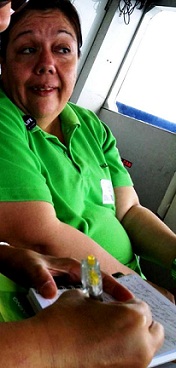Photos by Mila D. Aguilar
TEENS and young adults somersaulting on a field of grass with a view of Manila Bay in the background may not be a special sight, considering how energetic they can be.
It only touches the core of a spectator when one realizes that they live in urban communities so blighted that the available open space they have is a barangay basketball court, if there’s one at all.
During their first cruise to Corregidor Island, high school and college scholars of Real Life Foundation visited historic sites, felt the wind on their faces, breathed fresh air, laughed loudly and freely and shared some of their stories.
Wearing a T-shirt with the message “Helping others never goes out of style,” Jonathan Bacor, 22, a civil engineering major at the Technological Institute of the Philippines, is the son of a tailor and a fulltime homemaker.
His family is one where a child, in this case Jonathan, had to stop schooling for a year or two to let an older sister finish a course first. This meant he had to work in a fast-food crew to help pay the house rent. He was also part-time tutor in math and Kumon.
Around this time, Victory Christian Fellowship, a church group to which he belonged, was searching for scholars for Real Life Foundation. To qualify for a scholarship, the combined monthly family income has to be less than P10,000. Bacor’s grades in public high school, where he graduated fifth honorable mention among a thousand-plus students, qualified him for full tuition and allowance.
Unlike other scholarships that take care of tuition and other fees, Real Life invests in character development. Scholars are coached in leadership, integrity, faith and excellence (thus the acronym LIFE).
Bacor said: “It’s not all about keeping your grades high or being in the dean’s list to avail of an allowance. Our mentor checks on how we do both in school and at home. She observes how I deal with others, how I handle personal relationships.”
The scholars are not tied down to the foundation after they graduate, but they’re encouraged to pay it later. They’re helped in their search for a job that suits their educational attainment.
 Sony de la Calzada, Real Life director of partner relations, said the foundation is “not just about giving but partnering with us to change a life.”
Sony de la Calzada, Real Life director of partner relations, said the foundation is “not just about giving but partnering with us to change a life.”
“We can’t change the world, but if you start with one, you make a difference in the life of a person,” de la Calzada explained. “That person can create an impact on his/her relatives. Three generations down the road, who can tell what that person is going to be, perhaps a congressman or a senator?”
She continued: “A scholar who finishes college is motivated to get out of the poverty cycle without forgetting his/her roots. They must confront the roots so they can improve the community. The foundation is there to help these kids fulfill their destiny.”
The foundation has graduated 200 high school and college scholars since 2003, no small feat considering how, de la Calzada said, “the longer one keeps a student in school, the greater the possibility of the poverty level going down.”
The coaches give monthly training in good critical thinking, realizing one’s purpose in life, and resume writing, among many practical life skills. They give the kids a safe space where they open up about their hopes and dreams for their families.
De la Calzada added: “Attention is also love. You can give them money and education, but if you don’t give them love, they won’t thrive. This program cares for a person. Even if a parent behaves in a dysfunctional way, the child is still taught to respect the parent.”
Elaine Quindato, 17, openly said she’s a foster child with four grandmothers (all sisters) as guardians. Her biological mother gave her up because she could not afford to raise the baby. The child spent her formative years in Negros Occidental and moved to Metro Manila where she became an honor student at Balara High School, Quezon City.
In 2004, she met her real mother in Cavite where she works as a market vendor. There were tears but no upset of the status quo.
Forward-looking Quindato continues her studies at the National University as a secondary education major.
She said: “I realized I had the gift for teaching in high school on Student Teachers’ Week. Every time there was a chance to replace the teacher, I taught with a passion. I like to give my all even if it tires me.”
As another school year draws to a close, each scholar is encouraged to be grateful to life and its gift of hope.
